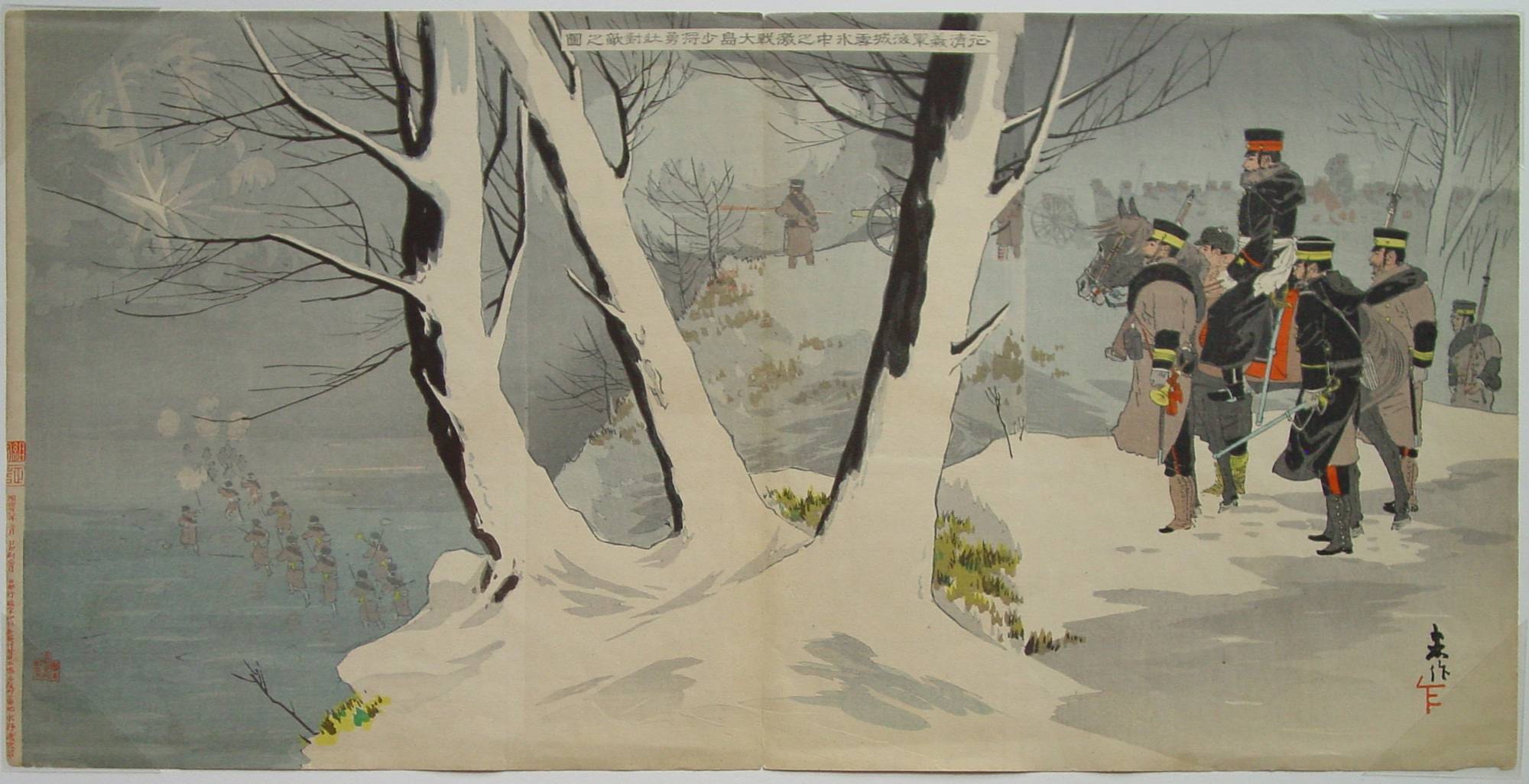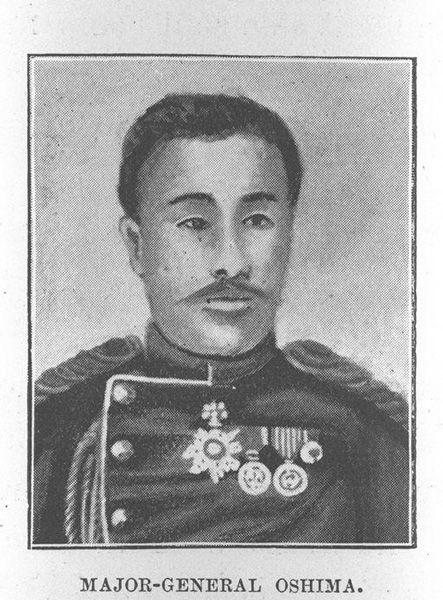About This Print
Source: Impressions of the Front: Woodcuts of the Sino-Japanese War, Okamoto, Shumpei, Philadelphia Museum of Art, 1983, p.31General Oshima Yoshimasa, on horseback, looks over his troops advancing toward the Manchurian battle site. War correspondent Kubota Beisen (1852-1906) reported: “At dawn on December 13, [1894] our entire army filed out of camp and marched through Manchuria’s hard ice and packed snow toward Haicheng. Only three li long (one mile), the trek was extremely difficult over the snow-and-ice covered mountains. A strong north wind stung both the men and the horses. As many as twenty-seven horses froze to death this day.”
The severity of the Manchurian winter forced cessation of military operations and the Japanese First Army encamped.
Officer's Winter Clothing
Source: Journal of the American Medical Association, Volume 24, January 5, 1895, American Medical Association, p. 223.Surgeon-General Isigaro: "The usual winter clothing consists of the regulation jacket, trousers, caps and shoes, with woolen socks and breast clothes, one blanket, besides underwear, etc. They have a thick fur bead covering, a fur overcoat, with double lined neck piece and extra flannel undershirt, extra woolen merino drawers and long stockings and extra blanket, gloves made of thick blanketing, a stock of paper underwear and a large fur skin, which may be used on certain duties, as well as for covering. This dress generally goes to officers of rank."
The Real Major-General Oshima
Overseas Images of Japan Database -
International Research Center for Japanese Studies, Kyoto, Japan
Print Details
| IHL Catalog | #110 |
| Title or Description | Illustration of the Japanese Army on Its Righteous Mission to Chastise China Fights Furiously at Haicheng in the Snow and Ice: The Brave Major General Ōshima at Battle Note: MFA, Boston translation is “Illustration of the Invasion of China During Which Our Troops Fought Fiercely in Ice and Snow at Haicheng and Major-General Ōshima Bravely Faced the Enemy" and RISD translates it as "Illustration of the invasion of China during which our troops fought fiercely in ice and snow and Major General Oshima bravely faced the enemy in ice and snow at Kaesong" 征清義軍海城雪氷中之激戦大島少将勇壯對敵之圖 [征清義軍海城雪氷中之激戦大島少将勇壮対敵之図] Sei Shin gigun Kaijō seppyōchū no gekisen Ōshima shōshō yūsō taiteki no zu |
| Artist | Taguchi Beisaku (1864-1903) |
| Signature |  |
| Seal | saku 作 (see above) |
| Publication Date | March 1895 (Meiji 28) |
| Publisher | Mizuno Asajirō 水野浅治郎 [Marks: pub. ref. 343] |
| Carver | hori Yata 彫弥太 [Watanabe Yatarō 彫工渡辺弥太郎 (1850-1913)] |
| Printer | suri Nakajima 刷中島 (see seal above) [Nakajima Senseido? (?-?)] |
| Impression | excellent |
| Colors | excellent |
| Condition | good - Slightly trimmed. Title sticker pasted across central sheet which is not unusual for senso-e. 3 sheets united by Japanese album backing paper. Vertical centerfold in middle sheet. Minor marks and flaws. |
| Genre | ukiyo-e - senso-e (Sino-Japanese War); Meiji era |
| Miscellaneous | Two square seals reading kumiai seigen 組合正言 appear above the publishing information in the left margin. They are possibly the seals of a publishing guild. |
| Format | vertical oban triptych |
| H x W Paper | 13 3/4 x 9 1/8 in. (34.9 x 23.2 cm) each sheet |
| Literature | Impressions of the Front: Woodcuts of the Sino-Japanese War,Okamoto,Shumpei, Philadelphia Museum of Art, 1983, pg. 31, pl. 41 |
| Collections This Print | Smithsonian National Museum of Asian Art S2003.8.56; Museum of Fine Arts, Boston: Jean S. and Frederic A. Sharf Collection 2000.52; Philadelphia Museum of Art 1976-75-9; Rhode Island School of Design Museum 1997.90.1; Ackland Art Museum University of North Carolina 2014.40.56a-c |
3/20/2020



